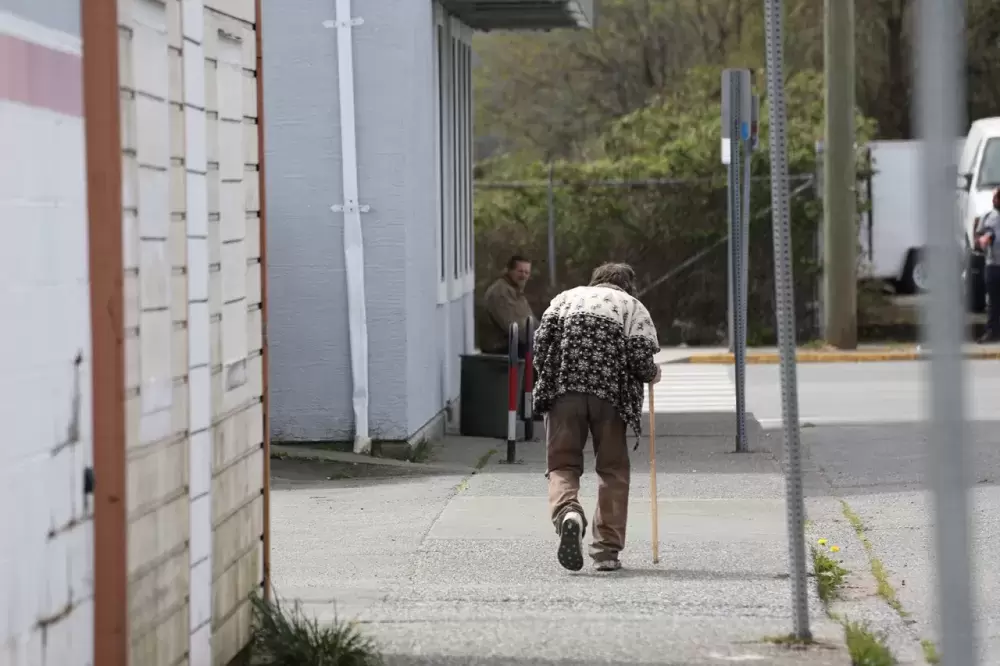The BC Coroner’s Service has issued a report stating that illicit drug overdoses in the province have risen sharply since February, just prior to the social isolation protocols set in place due to the coronavirus pandemic.
According to the coroner’s report, issued May 7, there were 113 suspected illicit drug toxicity deaths in the province in March 2020. This is the first time the number of illicit drug deaths exceeded 100 in a month since March 2019.
The number of illicit drug deaths in March 2020 amounts to an 80 per cent increase in unintentional overdose deaths in the Island Health region, over January and February 2020 averages.
“The increase in March occurred in every health authority, notably in Fraser (91 per cent increase) and Island Health (80 per cent increase),” the report states.
In Port Alberni, Wes Hewitt of the PA Shelter Society works on the front lines with marginalized people in the valley. He says that several service organizations collaborate to provide food, shelter and social supports to people dealing with addictions and/or barriers to affordable housing.
He says the Safe Injection Site (SIS) has remained open during the pandemic but fewer people are using it.
“I speculate it’s because there is so much money around,” said Hewitt, referring to emergency funding programs that arose out of the COVID-19 crisis. “It’s happening all over island; we think people are hunkering down, couch surfing, maybe pooling money for a hotel room.”
“One issue is CERB (Canada Emergency Response Benefit) and other emergency benefits; people on social assistance, for example, are getting extra money (during COVID-19) and there is a worry that people are now able to buy more drugs, so they are consuming far more,” Hewitt noted.
The Canada/US border has been closed for several weeks due to the pandemic but that has not seemed to have had much of an effect on Port Alberni’s illicit drug supply.
“[T]here is no shortage in the drug supply in the community,” said Hewitt, adding that clients have reported that some dealers are charging more for drugs since the pandemic began.
In terms of safety of the drug supply, Hewitt says there are always the same issues with Fentanyl.
“Depending on where crystal meth and other drugs are coming from, it’s always a concern,” he said.
Testing services are offered at the Safe Injection Site, supported by Island Health and the BC Centre for Disease Control.
“We will test a small amount of their supply for fentanyl before they use,” said Hewitt.
Most of the local drug supply, 80–85 per cent tests positive for Fentanyl, according to Hewitt. But that does not deter the client.
“Even after a positive test they will continue to use,” said Hewitt. “We try to convince clients to a try smaller amount than normal.”
Because Fentanyl is out there, support workers urge drug users to be more careful away from the site. They are asked to buddy up or arrange for someone to check on them.
“That’s why (safe consumption) sites are important – because they are supervised,” said Hewitt.
According to the BC Coroner’s Report of Illicit Drugs, there have been no deaths reported at supervised consumption or drug overdose prevention sites.
Social service agencies in Port Alberni have taken measures to deliver services to clients in a safer manner.
Since social distancing requirements have been in place, Hewitt says the Safe Injection Site remains open, delivering services and food to clients.
“We’ve changed up food distribution to meet social distancing requirements and to reduce handling of things; we’ve always had a high standard of cleaning at site,” he added.
But he remains concerned about what happens when clients leave the site.
“Sometimes there’s not the best social distancing once they leave the site; we do our best to educate,” said Hewitt.
A group of community volunteers have been making cloth masks which are then distributed throughout the community and at the Safe Injection Site.
“There are lots wearing them, some are using bandanas,” said Hewitt.
The Port Alberni Shelter Society has space for anyone experiencing homelessness. One of their houses is transitional and the other for low income families. There is a unit for women and children fleeing abuse.
The Phoenix house has 15 low barrier beds, which means, according to Hewitt, not many rules.
There is also the Sobering House where intoxicated people can be assessed on site and have a safe place to sleep it off.
“We offer four beds and, if they are medically fit, they can stay,” said Hewitt.
This is a short-terms shelter which, in safe situations, prevents unnecessary use of the hospital emergency department.
During the winter, BC Housing funded an additional 27 spaces at the shelter for Extreme Weather Response. The PA Shelter Society added 27 spaces at both the old and new shelter buildings on Eighth Avenue. BC Housing has continued to fund these spaces during pandemic.
Hewitt says there are spaces available if people want to get inside. But with the weather warming up, some like to be outdoors.
According to Hewitt, a Canadian Mental Health Association outreach worker and the RCMP recently did a cursory count of homeless people in Port Alberni. According the Hewitt, they counted 15 people.
“Some of them stay with us in inclement weather, but when the weather warms, they prefer to be outside where there’s no rules,” he noted.
When it comes to the pandemic, Hewitt is relieved that Port Alberni has done as well as it has.
“Due to some good planning and people working together, not traveling, social isolating, we’ve been fortunate to not have an outbreak in our community,” he said.







